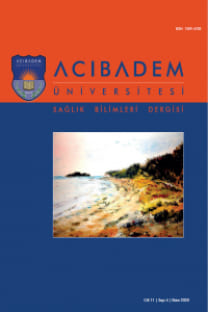An Evaluation of e-Health Literacy in University Students: The Example of Yozgat Bozok University
E-health literacy, internet, social media tools
___
References: 1. Ergün, S., Sürücüler, H. K., & Işık, R. (2019). Ergenlerde e-Sağlık Okuryazarlığı ve Sağlıklı Yaşam Biçimi Davranışları: Balıkesir Örneği. JAREN, 5(3), 194-203.2. Bertot JC, Jaeger PT, Hansen D. The Impact Of Polices On Government Social Media Usage: Issues, Challenges, And Recommendations. Government Information Quarterly2012; 29(1):30-40.
3. Chretien KC, Kind T. Social media and clinical care ethical, professional, and social implications. Circulation 2013; 127(13):1413-1421.
4. Babacan M, Haşlak İ, Hira İ. Sosyal Medya ve Arap Baharı. Akademik İncelemeler Dergisi 2011; 6(2):63-92.
5. Aslantekin, F, Yumrutaş M. Sağlık Okuryazarlığı Ve Ölçümü. TAF Preventive Medicine Bulletin 2014;13(4):327- 334.
6. Çimen, Z., Bayık Temel A. Kronik Hastalığı Olan Yaşlı Bireylerde Sağlık Okuryazarlığı ve Sağlık Algısı İlişkisi. Ege Üniversitesi, Sağlık Bilimleri Enstitüsü, Halk Sağlığı Hemşireliği, Yayınlanmamış Yüksek Lisans Tezi, İzmir 2015.
7. Pourrazavi, S., Kouzekanani, K., Bazargan-Hejazi, S., Shaghaghi, A., Hashemiparast, M., Fathifar, Z., & Allahverdipour, H. (2020). Theory-based E-health literacy interventions in older adults: a systematic review. Archives of public health = Archives belges de sante publique, 78, 72. https://doi.org/10.1186/s13690-020-00455-6
8. Norman CD, Skinner HA. eHealth literacy: essential skills for consumer health in a networked world. Journal of Medical Internet Research 2006; 8(4): e27.
9. Tamer Gencer Z. Norman ve Skınner’ın E-Sağlık Okuryazarlığı Ölçeğinin Kültürel Uyarlaması İçin Geçerlilik ve Güvenilirlik Çalışması. İstanbul Üniversitesi İletişim Fakültesi Dergisi; 2017(52):131-145.
10. Şengül H, Çınar F, Çapar H, Bulut A, Çakmak C. Sağlık Bilimleri Fakültesi Öğrencilerin E-Sağlık Okuryazarlığı Düzeyleri Ve İnternet Kullanımına Yönelik Tutumları: Bir Vakıf Üniversitesi Örneği. Journal of Social And Humanities Sciences Research 2017; 4(12): 1277-1287.
11. Rideout, Victoria (2001). Generation Rx.Com: How Young People Use the Internet for Health Information. A Kaiser Family Foundation Survey. California,USA.
- ISSN: 1309-470X
- Yayın Aralığı: Yılda 4 Sayı
- Başlangıç: 2010
- Yayıncı: ACIBADEM MEHMET ALİ AYDINLAR ÜNİVERSİTESİ
Apandisitin Olağan ve Olağandışı Patolojileri: 385 Hastanın Retrospektif Analizi
Cihan Uras, Veysi Hakan Yardımcı
Ceren Yıldız Eren, Özlem Özgür Gürsoy, Hulusi Göktuğ Gürer, Ayşe Tansu Koparal, Sabit Sinan Özalp
Defansif Tıp Uygulamalarında Aile Hekimlerinin Görüşlerinin Değerlendirilmesi: Isparta İli Örneği
Mini-dizileme ile Kanserdeki Moleküler Hedeflerin Hassas Tayini
Şirin YÜKSEL KILIÇTURGAY, Cemaliye BOYLU AKYERLİ
Murat YILDIZ, Sema AVCI, Oral MENTEŞ, Meriç ÜNVER, Deniz ÇELİK, Pınar AKIN KABALAK, Ülkü YILMAZ
Comparison of Laparascopic and Open Adrenalectomy
Onur DULGEROGLU, Tayfun BİLGİÇ, Mehmet HACİYANLİ
Dermatolojide Hasta Farkındalığının ve Tutumunun İncelenmesi
Melek Aslan Kayıran, Mehmet Salih Gürel, İlknur Özcan
Artificial Intelligence to Predict Esophageal Varices in Patients with Cirrhosis
Cem ŞİMŞEK, Emir TEKİN, Hasan SAHİN, Taha Koray SAHİN, Yasemin Hatice BALABAN
